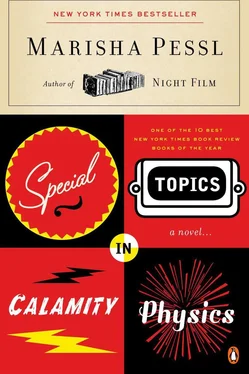VISUAL AID 4.0
“So how do you like it?” he asked cheerfully, lifting out one of the cases, frowning as he inspected the corners.
“It’s perfect,” I said.
“Isn’t it? The perfect surface on which to draft an admissions essay to make any Harvard graybeard shiver in his dress slacks.”
“But how much did it cost for you to buy it again — and then the shipping!”
He glanced at me. “Hasn’t anyone told you it’s blasphemous to ask the price of a gift?”
“ How much ? In total.”
He stared at me. “Six hundred dollars,” he said with a resigned sigh, and then, returning the case to the box, squeezed my shoulder and moved past me, back up the stairs, shouting at Brass and Woodwinds to speed up the tempo of their last movement.
He was lying. I knew this, not only because his eyes had flicked to the side when he’d said “six hundred” and Fritz Rudolph Scheizer, MD, had written in The Conduct of Rational Creatures (1998) that the cliché of a person’s eyes flicking to the side when he or she lies is “utterly true,” but also because, while surveying the underside of the desk, I’d spotted the tiny red price tag still knotted around the leg in the far corner ($17,000).
I hurried back upstairs, into the foyer where Dad was looking through another box, BOOKS LIBRARY. I felt bewildered — a little upset, too. Dad and I had long put into effect the Sojourner Agreement, the understanding we’d always give each other The Truth “even if she was a beast, frightening and foul smelling.” Over the years, there’d been countless occasions when the average dad would’ve cooked up an elaborate story, just to preserve the Parental Ruse, that they were sexless and morally flawless as Cookie Monsters — like the time Dad disappeared for twenty-four hours and when home, sported the tired yet satisfied look of a ranch hand who’d successfully horsewhispered a touchy Palomino. If I asked for The Truth (and sometimes I chose not to ask), he never let me down — not even when it let me hold his character up to the light and I could see him for what he sometimes was: harsh, scratchy, a few unexpected holes.
I had to confront him. Otherwise, the lie could wear me away (see “Acid Rain on Gargoyles,” Conditions , Eliot, 1999, p. 513). I ran upstairs, removed the price tag and kept it in my pocket for the rest of the day, waiting for the perfect checkmate moment to fling it at him.
But then, just before we left for dinner at Outback Steakhouse, he was in my room examining the desk, and he looked so absurdly cheerful and proud of himself (“I’m good, ” he said, animatedly rubbing his hands together like Dick Van Dyke. “Fit for St. Peter, hmm, sweet?”). I couldn’t help but feel that to call him out on this well-intentioned extravagance, to embarrass him, was sort of unnecessary and cruel — not unlike informing Blanche Dubois that her arms looked flabby, her hair dry, and that she was dancing the polka dangerously close to the lamplight.
It was better not to say anything.
We were in the Frozen section of Fat Kat Foods when I first saw Hannah Schneider, two days after our arrival in Stockton.
I was standing by our shopping cart, waiting for Dad to choose which flavor of ice cream he preferred.
“America’s greatest revelation was not the atom bomb, not Fundamentalism, not fat farms, not Elvis, not even the quite astute observation that gentlemen prefer blondes, but the great heights to which she has propelled ice cream,” Dad was fond of commenting while standing with the freezer door open and inspecting every flavor of Ben and Jerry’s, oblivious to the customers swarming around him, waiting for him to move.
As he scrutinized the cartons on the shelves like a scientist engaged in creating an accurate DNA profile from a hair root, I became aware of a woman standing at the far end of the aisle.
She was dark haired, thin as a riding crop. Dressed in funeral attire, a black suit with black 1980s stilettos (more dagger than shoe), she looked incongruous, bleached in the neon lights and achey tunes of Fat Kat Foods. It was obvious, however, in the way she examined the back of the box of frozen peas that she liked being incongruous, the lone Bombshell slinking into a Norman Rockwell, the ostrich amongst buffalo. She exuded that mix of satisfaction and self-consciousness of beautiful women used to being looked at, which made me sort of hate her.
I’d long decided to hold in contempt all people who believed themselves to be the subject of everyone else’s ESTABLISHING SHOT, BOOM SHOT, REACTION SHOT, CLOSE-UP or CHOKER, probably because I couldn’t imagine myself turning up on anyone’s storyboard, not even my own. At the same time, I (and the man staring at her with his mouth in an O holding a Lean Cuisine) couldn’t help but shout, “Quiet on the set!” and “Roll ’em!” because, even at this distance, she was unbelievably stunning and strange, and as Dad was famous for quoting in one of his Bourbon Moods, ‘Beauty is truth, truth beauty, — that is all / Ye know on earth, and all ye need to know.’”
She returned the peas to the freezer and began to walk toward us.
“New York Super Fudge or Phish Food?” asked Dad.
Her heels stabbed the floor. I didn’t want to stare, so I made an unconvincing attempt to examine the nutritional content of various popsicles.
Dad didn’t see her. “There’s always Half Baked, I suppose,” he was saying. “Oh, look. Makin’ Whoopie Pie. I believe that’s a new one, though I’m not sure how I feel about marshmallow with what, devil’s food. Seems a bit overwrought.”
As she passed, she glanced at Dad gazing into the freezer. When she looked at me, she smiled.
She had an elegant sort of romantic, bone-sculpted face, one that took well to both shadows and light, even at their extremes. And she was older than I’d realized, somewhere in her late thirties. Most extraordinary though was the air of a Chateau Marmont bungalow about her, a sense of RKO, which I’d never before witnessed in person, only while Dad and I watched Jezebel into the early hours of the morning. Yes, within her carriage and deliberate steps like a metronome (now retreating behind the display of potato chips) was a little bit of the Paramount lot, a little neat scotch and air kisses at Ciro’s. I felt, when she opened her mouth, she wouldn’t utter the crumbly speech of modernity, but would use moist words like beau, top drawer and sound (only occasionally ring-a-ding-ding ), and when she considered a person, took in him/her, she would place those nearly extinct personality traits — Character, Reputation, Integrity and Class — above all others.
Not that she wasn’t real . She was. There were hairs out of place, a quiver of white lint on her skirt. I simply felt somewhere, at some time, she’d been the toast of something. And a confident, even aggressive look in her eyes, made me certain she was planning a comeback.
“I’m thinking Heath Bar Crunch. What do you think? Blue?”
If her appearance in my life had amounted only to that single, Hitchcock cameo, I still think I would have remembered her, perhaps not in the same detail I remembered the ninety-five-degree summer night I watched Gone with the Wind for the first time at the Lancelot Dreamsweep Drive-in and Dad found it necessary to provide ongoing commentary on which constellations were visible (“There’s Andromeda”), not only while Scarlett took on Sherman and when she got sick on the carrot but even when Rhett said he didn’t give a damn.
As the oily hand of Fate would have it, I’d only wait twenty-four hours to see her again, this time in a speaking role.
Читать дальше












